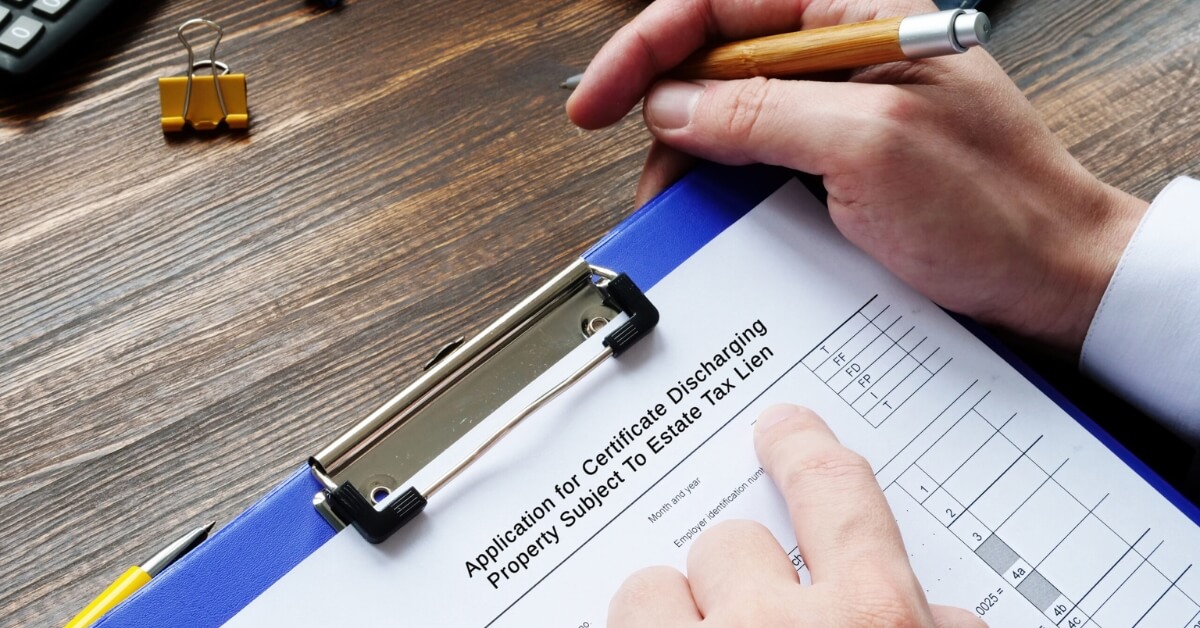Filing a lien on a property is a legal process that provides creditors with a claim against the property as collateral for unpaid debts. This process is particularly crucial in the realm of real estate, where property ownership is often one of the most significant financial investments individuals or businesses make.
Whether you are a landlord dealing with non-paying tenants, a contractor seeking compensation for work done, or a mortgage lender protecting your interest, understanding how to file a lien is essential to secure your financial rights. In this guide, we’ll explore the steps involved in filing a lien on a property, with a focus on commercial real estate transactions.
Mastering the intricacies of lien filings demands the expertise of seasoned professionals deeply knowledgeable in the realm of commercial real estate law. At Kelly Legal Group, our team of commercial real estate attorneys assumes a pivotal role in guiding property owners and businesses through the intricate journey of lien filing. Prioritizing results, transparency, and profound expertise, our attorneys guarantee the flawless execution of your lien filing, providing an unshakable shield for your rights and interests at every stage of the process.
👉Also read: 10 Common Legal Issues Faced By Small Businesses
Understanding the Importance of Liens in Real Estate Transactions
Liens play a pivotal role in the world of real estate transactions. They serve as a legal mechanism to ensure that individuals and entities who provide goods or services related to a property receive their rightful compensation. Here’s why liens are essential:
Security for Creditors: Liens provide creditors with a legal claim on a property, which can serve as collateral for unpaid debts. This security incentivizes lenders, suppliers, and contractors to engage in real estate transactions by reducing the risk of non-payment.
Protection of Interests: For mortgage lenders, liens protect their financial interests in the property until the borrower repays the loan in full. This safeguards lenders from potential losses if the borrower defaults.
Compensation for Contractors and Suppliers: Contractors and suppliers often rely on liens to ensure they are compensated for their work or materials used in property construction or improvement projects. Without liens, they might face significant financial risk.
Enforcement of Lease Agreements: Landlords can use liens as a means of enforcing lease agreements by claiming unpaid rent or other debts from tenants. This can be particularly relevant in commercial real estate, where substantial rental income is at stake.
Transparency in Property Records: Liens are recorded in public records, providing transparency to potential buyers and lenders about any outstanding claims on a property. This transparency is crucial in real estate transactions.
The Role of Commercial Real Estate Attorneys in Lien Filings
Commercial real estate attorneys play a vital role in the process of filing and resolving property liens. Here are some key functions they perform:
Legal Expertise: Attorneys are well-versed in the complex laws and regulations governing property liens, ensuring that all filings adhere to the legal requirements of the jurisdiction.
Notice Compliance: Attorneys help creditors prepare and serve the necessary notices, such as notices of intent to lien or notices of foreclosure, in accordance with state and local laws.
Document Preparation: They draft and review the various legal documents required for lien filings, including lien claims, releases, and satisfaction of liens.
Negotiation and Resolution: Attorneys can negotiate with debtors to reach settlements, payment plans, or other resolutions outside of the lien process. Their expertise can help avoid protracted legal battles.
Representation in Court: In cases where disputes escalate, commercial real estate attorneys can represent their clients in court, defending their lien rights or challenging improper liens.
Knowing Your Rights as a Property Owner
As a property owner, understanding your rights in the context of lien filings is essential to protect your interests and navigate potential disputes. Here’s a brief overview of key points to consider:
Right to Due Process: Property owners have the right to receive proper notice before a lien is filed against their property. This gives them an opportunity to address the underlying debt or dispute before a lien becomes official.
Right to Challenge: If you believe a lien has been improperly filed against your property, you have the right to challenge its validity. You can work with legal counsel to contest the lien and provide evidence to support your claim.
Right to Settlement: Property owners have the right to negotiate with creditors to settle debts and have liens removed. Settlement agreements can often result in lien releases once the agreed-upon terms are met.
Right to Legal Representation: Just as creditors have the right to legal representation in lien filings, property owners also have the right to hire legal counsel to protect their interests and guide them through the process.
Exploring the Implications of Liens on Commercial Real Estate
Liens in the realm of commercial real estate transactions have far-reaching implications for all parties involved.
Financing Challenges: Properties with outstanding liens can face challenges when seeking financing or refinancing. Lenders may be hesitant to provide loans against properties burdened by significant debts.
Property Sale Hurdles: When selling a property with a lien, the lien must often be satisfied before the sale can proceed. Clearing liens can lead to delays and impact the negotiation process.
Title Concerns: Liens are recorded against property titles, making it crucial for potential buyers to be aware of any outstanding claims. These claims can affect the property’s title and its marketability.
Property Development: Liens can impede property development projects, as contractors and suppliers may be hesitant to work on a property with a history of unpaid debts.
Real Estate Law and Its Impact on Lien Filings
Real estate law plays a significant role in the process of filing and managing liens. Some key aspects of real estate law impacting lien filings include:
State-specific Regulations: Real estate law varies by state, and each jurisdiction has its own rules and procedures governing lien filings. Understanding your state’s laws is critical to ensure proper compliance.
Statutory Deadlines: Many states have strict deadlines for filing liens after services have been rendered or debts have accrued. Failure to meet these deadlines can result in the loss of lien rights.
Enforcement Procedures: Real estate law outlines the legal processes by which liens can be enforced, including foreclosure in some cases. It’s important to follow these procedures accurately to protect your lien rights.
Fraud Prevention: Real estate law often includes provisions to prevent fraudulent liens from being filed. These provisions help ensure that only valid liens are recognized and enforced.
Steps to Filing a Lien Affidavit
Filing a lien affidavit involves the legal process of claiming a right to property as collateral for a debt or other obligation. The steps may vary based on your jurisdiction and the type of lien you’re filing. Here’s a general outline of the steps involved:
- Understand Lien Laws and Requirements: Familiarize yourself with the lien laws in your jurisdiction. Each state or region may have its own specific rules and requirements for filing a lien affidavit.
- Determine Eligibility: Make sure you have the legal right to file a lien. Typically, only parties who have provided goods, services, or materials to a property can file a lien against it.
- Gather Information: Collect all necessary information for the lien affidavit, including:
- Your name and contact information.
- The property owner’s name and contact information.
- A description of the property.
- Details of the goods, services, or materials provided.
- The amount of money owed.
- Prepare the Affidavit: Draft the lien affidavit document. You may be able to find template forms online, but it’s advisable to consult with a legal professional to ensure accuracy and compliance with local laws.
- Include Necessary Attachments: Attach any supporting documentation, such as invoices, contracts, and records of communication with the property owner. These documents will substantiate your claim.
- Notarization: In many jurisdictions, lien affidavits need to be notarized. This involves signing the document in the presence of a notary public who will verify your identity and witness your signature.
- File the Affidavit: File the completed and notarized lien affidavit with the appropriate government office. This could be the county clerk’s office, registrar of deeds, or another relevant office in your jurisdiction. Pay any required filing fees.
- Serve Notice: In some cases, you may need to serve notice to the property owner that you’ve filed a lien. This notice may need to be sent via certified mail or delivered by a process server.
- Comply with Deadlines: Different jurisdictions have specific deadlines for filing liens after you’ve completed your work or provided materials. Make sure you file within the required timeframe to ensure your claim is valid.
- Monitor the Process: Keep track of the lien process and any deadlines related to the release or enforcement of the lien. Some jurisdictions have specific procedures for removing liens once the debt has been satisfied.
- Enforce the Lien (if necessary): If the property owner does not resolve the debt, you may need to take legal action to enforce the lien. This could involve foreclosure proceedings to force the sale of the property to satisfy the debt.
Remember that filing a lien affidavit can be legally complex, and the specific steps can vary significantly depending on your location and the nature of the lien. It’s always a good idea to consult with a legal professional who specializes in your jurisdiction’s lien laws to ensure you follow the correct process.
Legal Matters and Lien Documentation
The complexity of lien filings necessitates the involvement of a skilled commercial real estate attorney. Our experts at Kelly Legal Group offer valuable guidance throughout the lien filing process, ensuring that your claim is properly documented and legally robust. With a focus on transparency and results, we are committed to protecting your rights as you navigate the intricate world of lien filings.
Filing lien documents with the county records office is a crucial step in the process. Our experts guide you through the documentation required and ensure that your lien filing is accurately submitted. With our in-depth knowledge of the process, we ensure that your lien claim is recorded appropriately, preserving your rights and interests.
👉Also read: Why Hiring a Real Estate Attorney Is Essential Before Signing a Commercial Lease Agreement
Mechanics Liens in Commercial Properties
Mechanics liens are legal claims that contractors, subcontractors, and suppliers can file against a property when they haven’t been paid for work or materials provided for construction or renovation. In commercial properties, these liens serve as a way for construction-related parties to secure their right to payment.
When someone files a mechanics lien, it can cloud the property’s title, making it challenging for the property owner to sell or refinance it until the lien is resolved. Property owners must be aware of potential mechanics liens and take appropriate steps to manage and address them.
Here are common situations when lien filing becomes necessary:
1. Unpaid Invoices: When invoices for work done or materials supplied are not paid within the agreed-upon timeframe, lien filing may become necessary to compel payment.
2. Breach of Contract: If there is a breach of the construction contract, such as non-payment, delayed payment, or payment disputes, filing a mechanics lien can be a means to enforce the contract terms.
3. Non-Performance: If a subcontractor or supplier has fulfilled their contractual obligations but the property owner or general contractor fails to pay, lien filing can be a way to seek compensation.
4. Project Abandonment: In cases where a project is abandoned or the general contractor defaults, subcontractors and suppliers may file liens to protect their financial interests.
5. Insolvency or Bankruptcy: If a party involved in the project, such as the property owner, general contractor, or subcontractor, files for bankruptcy or becomes insolvent, lien filing can help secure payment before assets are liquidated.
6. Payment Disputes: When there are disputes over the quality of work, delays, or other issues affecting payment, lien filing can be used as leverage to resolve these disputes and ensure fair compensation.
7. Unresponsive Parties: If attempts to communicate and negotiate payment have been met with silence or resistance, filing a lien can bring attention to the issue and potentially prompt a resolution.
8. Legal Requirements: In many states, lien filing is required by law to protect a contractor’s or supplier’s right to payment. Failing to file within the prescribed timeframe can result in the loss of lien rights.
9. Protecting Interests: Contractors and suppliers may file liens as a proactive measure to protect their financial interests, even before payment issues arise, especially on larger or high-value projects.
10. Encumbrance on Property: Mechanics liens create a cloud on the property title, which can make it difficult for property owners to sell or refinance the property. This can be a strong incentive for them to resolve payment disputes and clear the title.
It’s important to note that the specific rules and requirements for filing mechanics liens vary by state and jurisdiction. Contractors, subcontractors, and suppliers must be familiar with the laws and deadlines in their area to ensure that they can effectively protect their rights to payment through lien filing when necessary. Consulting with legal counsel or lien services may also be advisable to navigate the complexities of lien laws and processes.
Assessing Lien Filing in Construction Projects
Before initiating a mechanics lien, contractors and suppliers typically go through a series of steps to assess whether it’s necessary. This includes:
- Reviewing the Contract: They review the construction contract to ensure they’ve fulfilled their obligations and that they haven’t been paid as agreed.
- Providing Notices: Many states require contractors to send preliminary notices to the property owner, general contractor, or other relevant parties, indicating their involvement in the project.
- Tracking Payments: Contractors and suppliers keep meticulous records of payments and invoices, making sure they’re not in arrears.
- Consulting Legal Counsel: In complex cases or when disputes arise, they might consult an attorney experienced in lien laws to evaluate their situation.
- Filing the Lien: If they determine that they are owed money and haven’t received it, they can file a mechanics lien on the property. This serves as a legal claim on the property’s title, giving them a stake in any proceeds if the property is sold.
Examining Lien Filing for Commercial Real Estate Transactions
For individuals or entities considering purchasing or financing commercial real estate, examining the presence of mechanics liens is essential:
- Due Diligence: Prospective buyers and lenders conduct thorough due diligence to uncover any existing mechanics liens on the property. This includes reviewing title reports and public records.
- Negotiation: If mechanics liens are discovered, negotiations may be required between the seller and the lienholders to clear the title or address outstanding payments.
- Title Insurance: Title insurance policies are often purchased to protect against any undiscovered liens that may emerge after the transaction.
- Escrow and Closing: Escrow services are commonly used to ensure that all lien-related matters are resolved before the commercial property sale or financing transaction is completed.
Mechanics liens in commercial properties can significantly impact construction projects and real estate transactions. It’s crucial for all parties involved, including property owners, contractors, suppliers, and potential buyers or lenders, to understand the legal implications and take appropriate actions to protect their interests and ensure smooth transactions.
Protecting Lien Rights: Notices and Deadlines
In the majority of states, adhering to a crucial preliminary notice requirement is essential to safeguard your lien rights throughout a construction project. This preliminary notice should be dispatched early in the project timeline, typically around the initiation of your work.
If you’re engaged in a project located in a state where preliminary notices are mandated, failing to send one can significantly jeopardize your ability to assert lien rights. In essence, it’s a fundamental step to secure your financial interests.
Even in cases where preliminary notices are not explicitly required by state law, it’s a prudent practice for sub-tier participants to issue them. Not only does this foster stronger client relationships, but it can also expedite the payment process, ensuring a smoother financial transaction.
Certain states may not mandate an initial notice at the project’s outset but insist on one before you proceed to file an actual mechanics lien. This is referred to as a “Notice of Intent to Lien,” which serves as a pre-warning to the property owner, indicating your intention to file a claim if outstanding payments are not made.
Again, it’s advisable to consider sending a Notice of Intent (NOI) even if your state does not obligate it, especially if you’ve already dispatched a preliminary notice. An NOI provides the general contractor and property owner with one final opportunity to settle the outstanding payment, knowing that a mechanics lien is imminent. Both parties usually have a vested interest in avoiding the potential complications associated with a lien on the property.
Crucially, strict adherence to deadlines is paramount in preserving your lien rights. The entire process is governed by precise timeframes dictated by state laws. Missing a deadline can result in the unfortunate consequence of losing your lien rights altogether. Therefore, meticulous attention to these timelines is essential to safeguard your financial interests in the construction industry.
👉Also read: What Does a Property Attorney Do?
Partner with Kelly Legal Group for Expert Lien Filing Guidance
Liens play a critical role in safeguarding interests, ensuring payment, and resolving disputes in the realm of real estate and business law. At Kelly Legal Group, we are committed to providing expert guidance in navigating the complex landscape of lien filings. Our experienced commercial real estate lawyers offer transparency, expertise, and strategic counsel to ensure that your lien filing is meticulously prepared and positioned for success. With a focus on delivering results and empowering our clients, we stand ready to assist you in every step of the lien filing process.
Please reach out to us at (512) 505-0053 to discuss your specific lien filing needs and to learn more about how we can assist you in achieving your legal goals.






